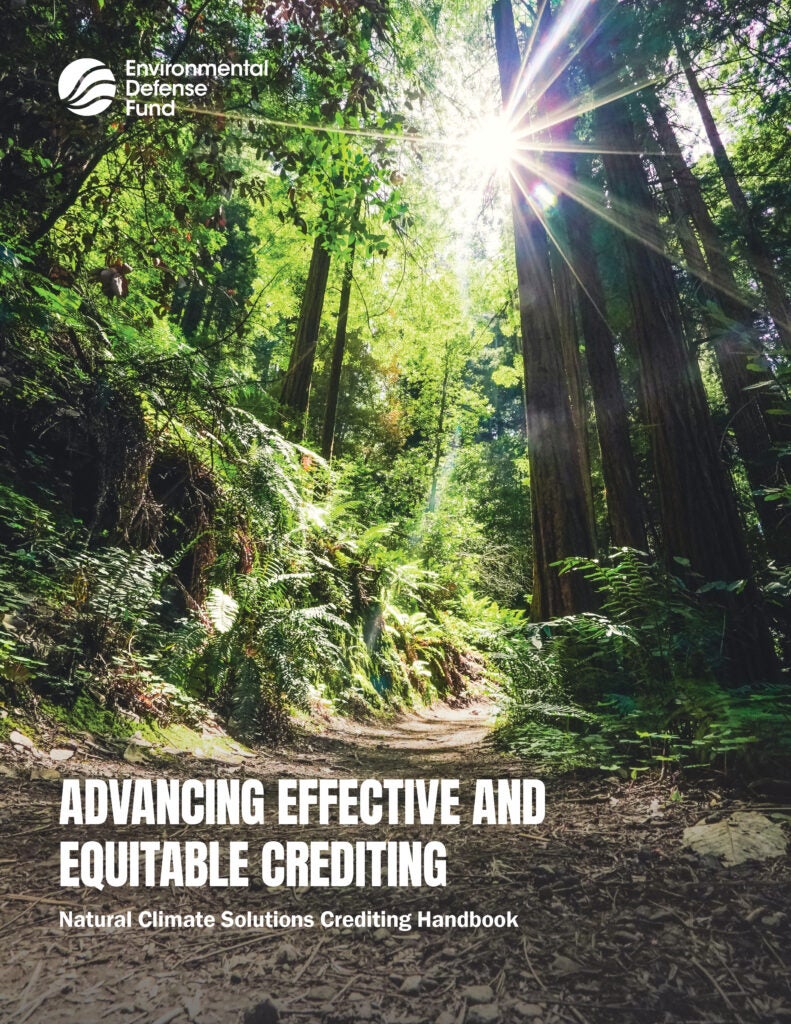This blog was authored by Christine Gerbode, EDF’s Manager of Jurisdictional Alliances and Britta Johnston, Senior Policy Analyst for Natural Climate Solutions at EDF.
Natural climate solutions are essential to achieving our global climate goals. A range of studies suggest that a major global scale-up of NCS activities (that is, ways of protecting, restoring, and better managing ecosystems and working lands) can contribute as much as a third of the climate mitigation needed to keep us on track with global climate goals by 2030. That’s in addition to the many other benefits that NCS can bring to people and the planet.
Well-designed NCS crediting systems can help channel urgently needed finance to the people, communities, and countries that steward natural ecosystems and working landscapes.
But NCS crediting remains controversial, in part because it can be a challenge to understand: new crediting methods, business models, and policy frameworks are evolving quickly at local and international levels, and competing messages come from passionate voices working on all sides. If uncertainty, misunderstandings, and confusion lead to unwarranted mistrust of NCS crediting, well-intentioned actors might be pushed to unnecessarily abandon one of the most powerful potential tools in the climate fight.
Stakeholders across the climate space need urgent help to cut through the noise on NCS crediting. The NCS Crediting Handbook aims to meet this need by clearly laying out how high-quality NCS crediting can work—for credit sellers, for credit buyers, and as part of an effective and ethical global climate response.
Un-muddying the waters
The Handbook is a first-of-its-kind effort to bring together a broad view of the essential concepts, terminology, context, and considerations across the NCS crediting landscape, drawing on resources and perspectives from a wide range of experts in the space.
This new resource covers topics related to both the creation and sale (or “supply” side) and the purchase and use (or “demand” side) of high-quality NCS credits. Key topics covered include:
What factors influence NCS credit quality, and tools/ mechanisms to help ensure high-quality credit production and use.
How buyers can purchase and use NCS credits, and how they might choose between options to ensure quality and climate integrity.
Types of NCS markets and transactions, and opportunities to help limit the risks that arise between buyers and sellers.
Challenges and opportunities related to scaling up financing for activities that can generate NCS credits.
In addition to defining and illustrating many basic concepts (such as key aspects of credit quality, and the tools used in many crediting frameworks to help ensure that quality), the Handbook aims to present diverse views on controversial topics, to empower readers to navigate ongoing and active debates.
In some cases, the Handbook identifies where consensus looks to be emerging on particular issues, such as the trend of growing support for jurisdictional-scale approaches to NCS accounting. For topics where significant debates are ongoing – for example, evolving conversations on how ‘permanence’ should be defined for NCS credits – the Handbook describes arguments from multiple perspectives to provide context.
In this same spirit, the Handbook draws on – and actively points readers to – many earlier publications focused on particular aspects of NCS crediting, as well as carbon crediting generally. Sections at the end of chapters direct readers to many of these in-depth publications, as opportunities to dive deeper into topics of special interest.
The Handbook is not meant to replace these earlier works. It will help readers find these important works and help them get more out of reading them.
The NCS Crediting Handbook offers a clear and impartial guide to support conversation and decision making across a complex range of topics.
Empowering readers to unlock the NCS potential
The Handbook is designed for anyone who wants to familiarize themselves with the issues surrounding NCS crediting, especially those who may need to make decisions about how to engage with one or more aspects of the space. This could include those who create and sell NCS credits, as well as those who might buy credits; those considering financing the activities that will generate NCS credits; and those developing regulations that will impact one or more of these actors.
Students and their teachers may also find the Handbook a useful introduction to the subject, as may those joining the NCS conversation as advocates in the policy world.
The climate fight is challenging enough without the frustrating disagreements that come from misunderstanding and miscommunication.
By reducing confusion around terminology, highlighting known and emerging solutions to controversial challenges, and facilitating informed debate, the NCS Crediting Handbook offers a clear and impartial guide to support conversation and decision making across a complex range of topics.
In turn, we hope this level-setting can provide new clarity for many on the important technical questions and other challenges that remain – moving all of us one step closer toward equitably unlocking the full potential of NCS.
Download and learn more about the NCS Crediting Handbook here. Receive future updates about EDF’s work and events on natural climate solutions, including future issue briefs, by signing up here.










